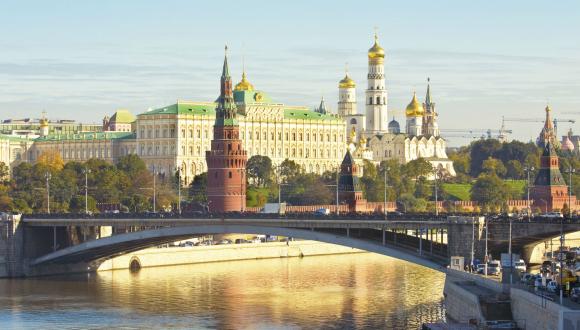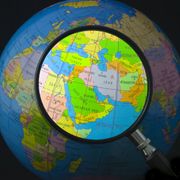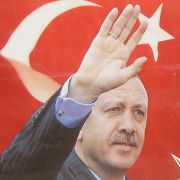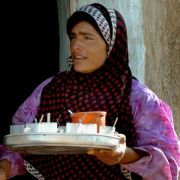Russia’s Leverage in the Middle East
 It is said that Russia’s Vladimir Putin has overplayed his hand in Ukraine and Crimea. Faced with Western sanctions and plummeting oil prices, Russia’s economy is vulnerable and its currency is rapidly losing its value.[1] Some policy experts believe that Putin’s policies have weakened and isolated Russia and undermined its ability to project power beyond its borders.[2] Yet in the Middle East, Putin appears undeterred. Russia’s power and influence in the region have grown during the last six months and Moscow continues to hold significant leverage with key regional actors. This leverage allows Russia to either facilitate or subvert Western objectives in the region, in line with what it perceives as its own national security interests.
It is said that Russia’s Vladimir Putin has overplayed his hand in Ukraine and Crimea. Faced with Western sanctions and plummeting oil prices, Russia’s economy is vulnerable and its currency is rapidly losing its value.[1] Some policy experts believe that Putin’s policies have weakened and isolated Russia and undermined its ability to project power beyond its borders.[2] Yet in the Middle East, Putin appears undeterred. Russia’s power and influence in the region have grown during the last six months and Moscow continues to hold significant leverage with key regional actors. This leverage allows Russia to either facilitate or subvert Western objectives in the region, in line with what it perceives as its own national security interests.
According to Lebanese scholar Talal Nizameddin, Russia views its regional posture in the Middle East as a means to improve its relative power position in the broader international system, particularly vis-à-vis the U.S. and the European Union (EU). Therefore, if Mikhail Gorbachev's foreign policy in the 1980s had ended the Soviet Cold War tactic of manipulating "regional conflict through proxies to barter with the West,” it would appear that Putin has reintroduced it.[3]
Putin has been able to expand Russia’s influence in Turkey and Iran, two of the Middle East’s most important states. Erdoğan’s Turkey appears to be increasing its energy dependency on Russia, which Turkey views as inter-dependency, and the declining price of oil and Western sanctions is pushing Iran closer to Russia, however reluctant Iran might be to draw too close to the Russian Bear. Finally, Russia has also managed to seize control of diplomatic initiatives to de-escalate the Syrian civil war, reducing the influence of the EU and the United States in the process.
Despite the decline in oil prices, Russia continues to use its role as a natural gas supplier to project influence. On December 1, 2014, Putin canceled Russia’s plans for its €15.5 billion South Stream natural gas pipeline, which was intended to deliver 67 billion cubic meters (bcm) of natural gas per year to Europe through a 900 kilometer underwater Black Sea pipeline to a hub in Bulgaria, where it would serve as an alternative to delivering gas to Europe through Ukraine.[4] It is believed that EU and U.S. pressure on Bulgaria to substantially alter the terms of the South Stream project forced Russia to cancel it. Stronger EU resistance to the project was the result of Russia’s actions during the Ukraine crisis.[5]
Russia was able to reverse its South Stream setback by turning to Turkey. During a visit to Ankara in early December 2014, Russia announced a new pipeline project with Turkish petroleum pipeline company Botas, which has been referred to as the “Turkish Stream” project. Turkey’s Prime Minister, Ahmet Davutoğlu reaffirmed Turkey’s desire to position itself as an energy hub with his recent remark that "All energy will flow via Turkey just as all roads lead to Rome."[6]

A Russian oil rig. Photo credit: Krichevski via Wiki Commons
The Turkish Stream pipeline project will expand the existing Russia-Turkey Blue Stream pipeline and deliver approximately the same amount of natural gas as South Stream (63bcm instead of 67bcm) to a hub on the Turkey-Greece border, where it will be transported to Gazprom’s southern European clients. Russia also announced it would deliver an additional three billion cubic meters of natural gas to Turkey via Blue Stream at a six percent price reduction in 2015.[7] Turkey is expected to consume 14 billion cubic meters of the 63bcm annual transported by the new pipeline. According to Turkish energy minister Taner Yıldız, Turkey consumed 48bcm of natural gas in 2014, and it is expected to consume 51bcm in 2015.[8] Despite Turkey’s increasing dependency on Russian gas, Russia’s weak economy and increasing isolation does give Turkey some leverage in negotiating a better pricing deal. Media reports suggest that Turkey will not be content with the six percent price reduction announced by Putin and will push for something closer to a 15 percent reduction.[9]
Another important symbol of the increasingly close Russia-Turkey energy relationship was the Turkish Ministry of Environmental and Urban Planning’s approval for the Akkuyu Nuclear Plant in Mersin, which will be built by Rosatom, a Russian company, for approximately $20 billion.[10] This approval coincided with Putin’s visit to Turkey and the introduction of the new “Turkish Stream” project. A Turkish parliamentarian, Republican People's Party (CHP) Adana deputy Faruk Loğoğlu, argued that Turkey and Russia have both been isolated (by the EU) for different reasons and they therefore wish to "ease the feeling of loneliness by getting together." Loğoğlu added that "the South Stream project may seem to bring Turkey and Russia together; however, it increases Turkey’s energy dependency on Russia.”[11]
Russia has also positioned itself as a financial partner for Iran, which faces Western sanctions related to its nuclear program. There were media reports throughout 2014 suggesting Russia and Iran were negotiating a $20 billion oil-for-goods deal that was intended to help Iran avoid Western sanctions.[12] This deal was never consummated, but as both Russia and Iran’s currencies face increasing pressure as a result of declining oil prices, there is a stronger economic logic for broader commercial trade between Russia and Iran. Such bilateral trade can be structured as barter or be conducted in Russian rubles and Iranian rials. The latter would allow both states to avoid Western banking institutions, which have become vehicles for carrying out Western sanctions. For Iran, such bilateral trade with Russia would help Iran avoid the temptation of reducing its deficit by increasing the price of foreign exchange.[13] In 2014, Iran’s exports to Russia increased by 20 percent.[14]
In the absence of Western energy companies, Russia has also begun to make inroads into the Iranian energy sector. In September, Russian Energy Minister Alexander Novak visited Tehran and met with Ali Akbar Salehi, the head of Iran’s Atomic Energy Organization, and Hamid Chitchian, Iran’s Energy Minister, to discuss Russia’s role in expanding Iran’s energy infrastructure.[15] These discussions have explored the possibility of Russia providing Iran with an additional nuclear reactor, as well as a broader Russian role in Iran’s electricity production. More recently, Asghar Soheilipour, an adviser to the managing director of the National Iranian Gas Company (NIGC), said that Russian companies have shown interest in financing the country’s oil and gas projects. Soheilipour had announced that a letter of understanding was signed with a Russian company to build a $700 million, 300-kilometer gas pipeline from Iranshahr in southeastern Iran (Sistan and Baluchistan provinces) to the Chabahar Free Trade Zone, which is located on the coast of the Gulf of Oman.[16] Soheilipour expects the project to be completed in two years.[17]
Even if the growing Russian-Iranian economic cooperation is still largely confined to non-binding agreements and declarations, it nevertheless plays an important role because it allows both parties to demonstrate that they possess viable and mutually beneficial alternatives to the West’s foreign policy preferences. It also allows Russia to continue to demonstrate to the West that Iran cannot be effectively isolated or pressured without Russian cooperation. Russia's implicit message to the West is that if it wants a successful resolution to the Iranian nuclear issue, it will need Russia’s cooperation. Therefore, Russia uses its ties with Iran as an implicit bargaining chip to advance other Russian national security interests.
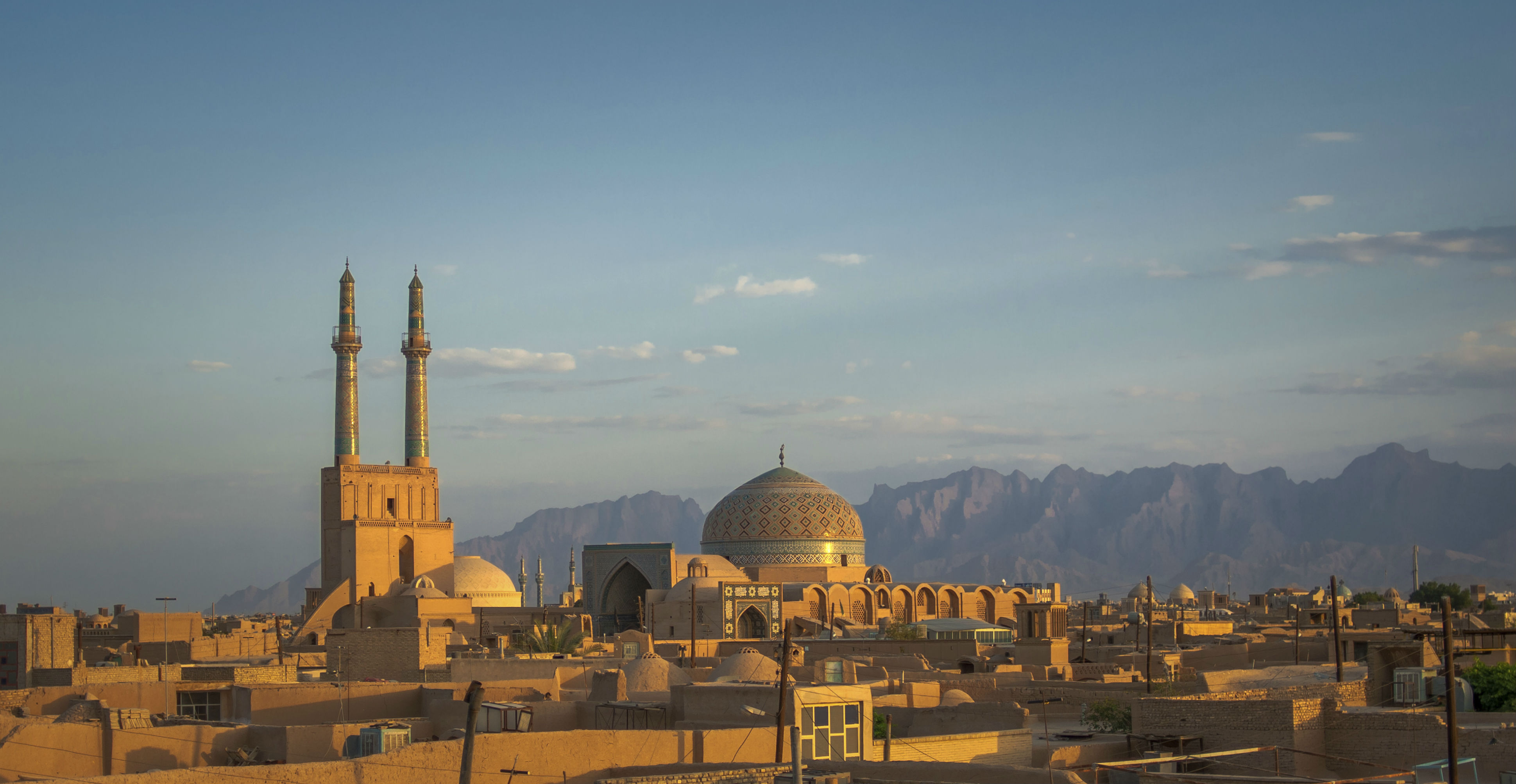
Nevertheless, Russia’s relations with Iran are more than just a function of Moscow’s desire for a bargaining tool. Putin’s coterie view Iran as an important battleground in what they see as the Great Power competition between East and West. Sergei Karaganov, the influential Dean of the School of World Economics and World Politics at the National Research University–Higher School of Economics in Russia, alluding to Iran’s position between the U.S. and China, claimed, “The future of all Asia largely depends on which alliance Iran eventually chooses.”[18]
Moscow’s steadfast political support for the Asad regime in Syria has allowed Russia to convincingly project its power in the Middle East for the first time since the end of the Cold War. Putin has allowed Iran to carry the lion’s share of the military and financial burden of supporting Asad with fighters and a generous line of credit, while Russia has used its permanent seat on the U.N. Security Council to shield the Asad regime and protect its interests in Syria. To be sure, Russia has also provided military technology, training, and active aid to Asad’s forces and lent generously to the regime.[19] Even as its own economy struggles to stay afloat under the burden of Western sanctions imposed in the wake of the Ukraine crisis, Russia is reportedly willing to extend Asad a new $1 billion line of credit (and $900 million in aid for fuel and food) in 2015.[20] This support for the Asad regime makes Russia a decisive arbiter in any diplomatic initiative that seeks a negotiated solution to the Syrian civil war.[21]
Despite the declining price of oil, Russia maintains significant sources of leverage in the Middle East. As opposed to the backlash from its involvement in Ukraine, Russia has not paid a high price – either in blood, treasure, or political capital – for its influence in the region. And Russia’s ability to enable or, alternatively, act as a spoiler across the Middle East means that its interests cannot be easily dismissed or marginalized. Even as its economy weakens and its currency is devalued, it would be a mistake to expect that Russia will abandon what it views as its valuable levers of power. Indeed, as relations between Russia and the West continue to fray, those instruments of global influence are likely to be viewed as essential bargaining chips. Finally, from the Israeli perspective, Russia’s growing ties with Iran and Turkey, who feel spurned or isolated by the West, is undoubtedly troubling. Moreover, it is worth noting that over and above the technical and financial challenges (and feasibility) of exporting Israeli natural gas to southern Europe via a prospective 1,500 kilometer deep sea pipeline (Israel-Cyprus-Greece-Italy),[22] such a venture is likely to draw the ire and resistance of Russia (and Turkey), which has vigilantly maneuvered to protect its European market share.
As originally published in TEL AVIV NOTES.
Brandon Friedman, Ph.D, is a Research Fellow at Tel Aviv University's Moshe Dayan Center for Middle Eastern and African Studies.
[1] Daniel Cloud, “Revenge of the Ruble: What the Crisis Means for Putin,” Foreign Affairs.com, December 18, 2014; Keith Johnson, Jamila Trindle, “Making Putin Blink,” Foreign Policy.com, December 16, 2014; Paul Krugman, “Putin’s Bubble Bursts,” The New York Times, December 19, 2014.
[2] For example, David J. Kramer, “The Delusional Vladimir Putin,” The American Interest, December 18, 2014. For a notable exception to this view, see: Nikolas K. Gvosdev, "Russia's Moment of Crisis: Moscow Might Be Down, but Not Out," The National Interest, December 18, 2014.
[3] See: Talal Nizameddin, Putin’s New Order in the Middle East (London: I.B.Tauris, 2013); and, Maxim A. Suchkov, "What's behind Russia's Mideast Strategy?," Al Monitor, November 30, 2014; Fyodor Lukyanov, “Russia’s Asymmetrical Response: Global Aikido,” in Costs of a New Cold War: The U.S.-Russia Confrontation over Ukraine (Center for The National Interest, September 2014), Paul J. Saunders, ed., pp. 39-50; Also, see: Vladimir Putin, "New Rules or a Game Without Rules," Valdai International Discussion Club XI, Sochi, October 24, 2014 – Counterpunch, October 27, 2014.
[4] Energy Monitor Worldwide, December 22, 2014.
[5] Jim Yardley and Jo Becker, “Putin's quest for a pipeline exposed big ambitions: Foiled Bulgarian gas deal aimed to reassert sway with strong-arm tactics,” The New York Times (International), January 2, 2015.
[6] Anadolu (Anatolia) News Agency – BBC World Monitoring Service, December 24, 2014.
[7] Pinak Ranjan Chakravarty, “Russia-Turkey Deal and the Geopolitics of Gas – Analysis,” Eurasia Review, December 30, 2014.
[8] Intellinews – Turkey Today, December 30, 2014.
[9] E. Gurkan Abay and Ovunc Kutlu, Anadolu (Anatolia) Agency, December 20, 2014.
[10] Xinhua General News Service, December 23, 2014.
[11] Cihan News Agency (CHA), December 22, 2014.
[12] Jonathan Saul and Parisa Hafezi, “Exclusive: Russia, Iran negotiating a big oil-for-goods deal,” Reuters, January 10, 2014; Jonathan Saul and Parisa Hafezi, “Iran, Russia working to seal $20 billion oil-for-goods deal: sources,” Reuters, April 2, 2014; “Iran says oil barter deal with Russia very hard to seal,” Reuters, April 14, 2014; Esther Tanquitic-Misa, “Russia wants Iran’s oil in exchange for grain,” International Business Times, December 1, 2014.
[13] Hossein Raghfar, “The government should draft a shadow budget for the coming [Iranian] year,” E’temad, December 20, 2014 – BBC Worldwide Monitoring, December 21, 2014.
[14] Iranian Student News Agency (ISNA), December 30, 2014.
[15] Agence France Press, September 9, 2014.
[16] Iranian Government News, January 5, 2015.
[17] Trend Economic Daily News, January 5, 2015. For more on Chabahar’s strategic importance, see: Micha’el Tanchum, “India’s Construction of Iran’s Chabahar Port Transforms Tehran’s International Strategic Position,” Iran Pulse No. 63, Alliance Center for Iranian Studies, December 18, 2013.
[18] Sergei Karaganov, “Going Forward to Asia?,” Russian Politics and Law 46:6 (November-December 2008), 41-46, here 43.
[19] Paul J. Saunders, "Russia's role in the fight against IS," Al Monitor, October 6, 2014.
[20] Sami Kleib, “Iran, Russia weapons and $6.4 billion for Syria,” al-Akhbar, December 22, 2014.
[21] Joseph Bahout, “Russia and Iran Step into Syria’s Diplomatic Vacuum," Carnegie Endowment for International Peace, December 30, 2014.
[22] “Israel pitches ‘massive’ natural gas pipeline to Europe,” Times of Israel, November 20, 2014; “Russia Cannot Be Squeezed Out of Energy Market,” Legal Monitor Worldwide, December 26, 2014
 TEL AVIV NOTES is an analytical update on current affairs in the Middle East, published by Tel Aviv University's Moshe Dayan Center for Middle Eastern and African Studies, with the support of the V. Sorell Foundation.
TEL AVIV NOTES is an analytical update on current affairs in the Middle East, published by Tel Aviv University's Moshe Dayan Center for Middle Eastern and African Studies, with the support of the V. Sorell Foundation.

